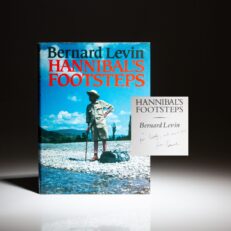Description
First edition of John Dunn: The White Chief of Zululand, inscribed to U.S. Ambassador Ed Perkins, with a laid-in letter from Dan Dunn, Chairman of the Dunn Descendants Association.
Octavo, 288pp. Red cloth, title in white on spine. Stated “First published 1985” on copyright page. Solid text block, light rubbing to corners and edges, slight bend to front cover, a near fine example. In publisher’s dust jacket, some sunning to front cover and spine, a few small closed tears to spine, rubbing to edges, a bright example. Inscription on title page reads: “4 March 1987 / Ambassador + Mrs. Edward Perkins / May this book on John Dunn and his descendants shed further light on not only one of South Africa’s most unique communities – The Dunns of Zululand – but on the beauty, tragedy and fascination that is South Africa – Warmest Wishes / Charles Ballard.” Signed on frontispiece by “D A Dunn / Chairman / Dunn Descendants Association.” The letter welcomes Ed and his wife to South Africa and invites them to visit the Dunn family.
John Dunn (1834-1895) was a South African settler who represented both colonial and Zulu interests, eventually earning some influence over the Zulu people before the Zulu War which forced him to side with the British. After the war, Dunn was granted land ownership between the colony and Zululand, where he raised the 117 children he had with his wife and 48 Zulu women. Daniel Dunn, a descendant of John Dunn, was elected Chairman of the Dunn Descendants Association in 1974. The family has land disputes with Zulus, who claim their historic land was taken from them under apartheid, while the Dunns claim to legally own the land.
Dr. Edward J. Perkins (1928-2020) served as U.S. Ambassador to the United Nations, as well as Liberia, South Africa, and Australia throughout his 25-year foreign service career. In 1986 President Ronald Reagan appointed Perkins to serve as ambassador to South Africa in hopes of fending off a congressional override to his veto of economic sanctions against the country. It was a controversial decision amidst apartheid in South Africa, and many Black leaders urged Perkins to not take the role. Perkins accepted the position and served until 1989, one year before Nelson Mandela was released from prison. He was appointed U.N. Ambassador by George H. Bush in 1992, serving for one year.









